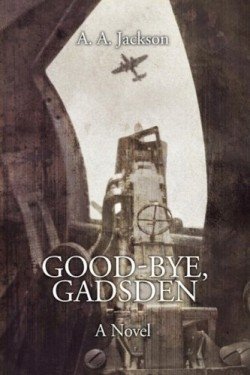Good-Bye, Gadsden
Set in the 1940s with World War II pressing men into service and young women taking over the responsibilities and work at home this novel presents the wartime romance of John Winstead. While recovering from severe war wounds Winstead recalls growing up in Gadsden Alabama and his first and only true love: “Sylvia Ross Barnes was easily the most beautiful woman in Gadsden. Long curly blonde hair framed an oval face. Light freckles were peppered across her nose and upper cheeks….”
The war true love and the end of an idyllic era come together to form an absorbing read. Yet this novel lacks immediacy and tension. It reads like an autobiography with the emphasis on relaying incidents rather than painting scenes infusing emotion into description or bringing the events and characters to life: “It was the first Ann knew of my relationship with Sylvia. She listened in silence. When I finished she pulled me to her laying my head in her lap and stroked my hair.”
The author compensates with a sprinkling of somewhat superficial but none-the-less effective details that lend a sense of realism. “Japanese pilots were notorious for attacking life rafts on the open ocean” the narrator explains. “We were sitting ducks—and we knew it…. I slid over the back of the first raft….My flyer’s boots began filling with water…”
Bullets hit their mark and the next thing we know Winstead calls out for Sylvia from a coma while aboard the hospital ship. We follow his coma dreams and memories back to his home town and his first meeting with Sylvia. She six years Winstead’s senior married a drunken useless man called (what else) Bubba. Sylvia runs the family’s dry cleaning business after her step-father committed suicide. Winstead a na&239;ve and virginal high school student rides his bicycle around town collecting loads of dirty laundry that he drops off to her business in exchange for spending money. Sylvia eventually seduces him in her office and they begin an affair that ends after Winstead rescues her from Bubba. Sylvia leaves town. Devastated by her departure Winstead puts his sports scholarship and college dreams on hold to join the war effort.
The author an award-winning television and radio anchor/news director knows how to report a story. Writing fiction though requires storytelling skills that differ from those used in journalistic reporting. Jackson creates a believable setting drawing readers into the 1940s’ war and struggle for survival but she misses opportunities to bring this novel to life. With a thorough edit an eye for more energized and colorful scene painting and richer detail this novel could rival some of the better war romance novels. As it is it reads more like a biographical narrative. Readers who enjoy romance in war times a male narrator’s perspective and gentle descriptions of war would find this a satisfying read.
Reviewed by
Dawn Goldsmith
Disclosure: This article is not an endorsement, but a review. The publisher of this book provided free copies of the book and paid a small fee to have their book reviewed by a professional reviewer. Foreword Reviews and Clarion Reviews make no guarantee that the publisher will receive a positive review. Foreword Magazine, Inc. is disclosing this in accordance with the Federal Trade Commission’s 16 CFR, Part 255.

